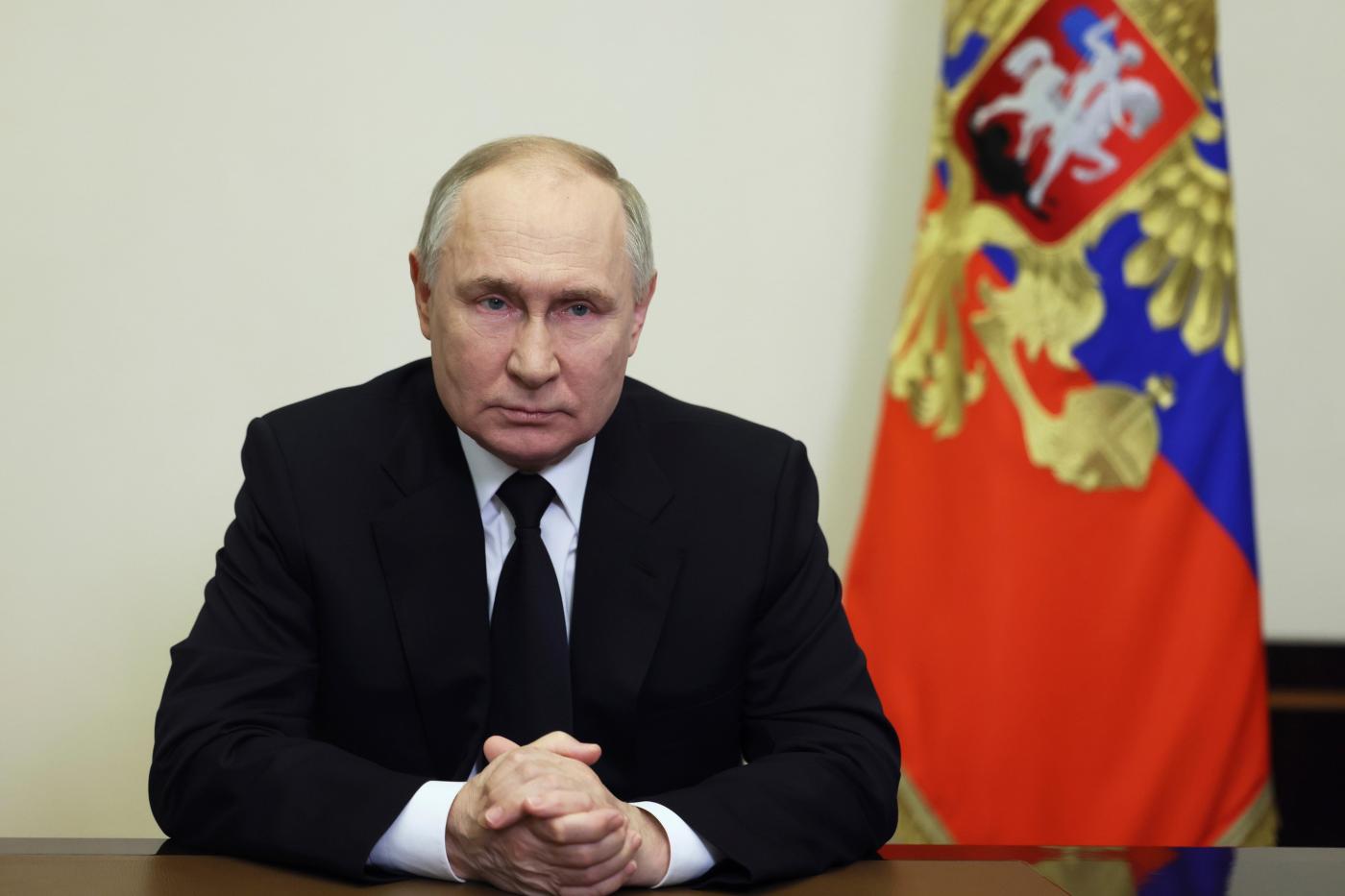
Andreas Kluth: Even Republicans are now calling out Putin’s lies
As America’s support for Ukraine hangs in the balance, so does its commitment to truth over lies, and its resolve to resist Russian disinformation. The good news, after lots and lots of bad news, is that the pro-truth, pro-Ukraine resistance is now, at last, mobilizing even inside the Republican Party in Congress.
Troll and bot armies commanded by Russian President Vladimir Putin have been waging active information warfare against the U.S. and other Western democracies for years. And Putin’s tactics seem to be working: Witness the aid package to Kyiv that’s been stuck in Congress for half a year, and is now likely to come up again within weeks. One reason for the delay, which costs Ukrainian lives every day, is that Putin’s lies have messed with the minds of some Republicans in Congress — few in number, but enough to cause trouble and deadlock.
The reality distortions and inversions include Kremlin memes suggesting that Ukraine and its president are corrupt or even at fault for the war, that Putin and his invasion aren’t really that bad, and that all sorts of other problems — Joe Biden, the southern border, you name it — are immeasurably more urgent. The most influential “useful idiot” (a term of art dating to Soviet times) regurgitating Putin’s narratives is of course former President Donald Trump, who increasingly phones and tweets direct instructions to his MAGA cronies in Congress.
That’s why it’s encouraging to see Republicans including Michael McCaul, chair of the House Foreign Affairs Committee, openly admitting that “Russian propaganda has made its way into the United States, unfortunately, and it’s infected a good chunk of my party’s base.” Such candor allows other Republicans to speak out too. Rep. Michael Turner, chair of the intelligence committee, says that McCaul’s assessment is “absolutely true,” and that some of the Russian memes “we even hear being uttered on the House floor.”
Calling out and rejecting disinformation from any source is the only way to meet this threat, as another Republican, Ronald Reagan, demonstrated in the 1980s. Back then, long before most of us logged on to the internet, the Kremlin’s disinformation machines were already humming, as the New York Times has documented. All KGB agents had to devote at least 25% of their time to producing deception campaigns to make Americans hate and distrust one another and their government. And one of those KGB agents was a young Vladimir Putin.
A textbook example was Operation Infektion.
In 1983 the KGB planted a made-up narrative in a pliable and obscure Third World newspaper, Patriot Magazine in New Delhi. The lie was that the U.S. government had engineered the AIDS virus to kill Black Americans and gay people. Then the Soviets waited for a few years. Eventually, they ran the same story in a Moscow newspaper, citing Patriot Magazine as a source. They also found useful idiots (again, they actually use that term) in the form of a married couple in East Germany, who put a scientific sheen on the fabrication. Newspapers in Africa and other regions, including the U.S., then reported on what we would call the thread. The climax came in 1987, when Dan Rather read the allegation out loud on the CBS evening news.
The difference between then and now is that Reagan confronted Mikhail Gorbachev with the hoax, and the Soviet leader publicly apologized. The similarity is that even this retraction didn’t stop millions of people from believing this bilge to this day.
Once Putin became president of Russia and the internet’s newfangled social media invaded our lives, the Kremlin kept upping its game. The recipe stayed the same, though. Moscow looks for pathologies in the target society (racial tensions, worries about migration or partisan polarization, say), then curates distortions or lies to make those worse. It usually seeks out some kernel of truth (an actual pizza parlor in Washington that’s mentioned in a campaign email, say), then builds a Big Lie on top of it (that Democrats run a pedophile ring from said pizza parlor). Russia always hides and denies its own role in seeding the lie, while letting the useful idiots in the target society’s media or politics do the work of spreading. The overall goal is to get us to tear each other apart.
This is also how Moscow interfered, for example, in the U.S. election of 2016 and continues to meddle today, as the Washington Post has revealed, after obtaining internal Kremlin documents. The Russians instruct their troll farms to impersonate Americans and create posts, videos or articles — often on social-media accounts that are deleted as soon as the disinformation has been reshared — to stoke hysteria over immigration, inflation, crime or the Biden administration.
And, of course, to cast doubt on Ukraine as a victim of Russian aggression and a defender of its own liberty and the whole international order. Here’s just one lie with eerie echoes of that AIDS hoax from the 1980s. The Russians, via several intermediaries, planted a fabrication in an American internet publication that Ukrainian President Volodymyr Zelenskyy had pilfered American aid money to buy himself two luxury yachts. It was nonsense. And yet people including the most idiotic of useful idiots, Rep. Marjorie Taylor Greene, linked to the story and tweeted that “anyone who votes to fund Ukraine is funding the most corrupt money scheme of any foreign war in our country’s history.”
And where is Trump in all this? In 2016 he benefited from Russian disinformation, even though he may not have “colluded” in it. His Big Lie that the 2020 election was “stolen” is also a favorite of the Russian trolls. His first impeachment centered on his attempt to browbeat Zelenskyy into digging up dirt on Biden. After Putin attacked Ukraine in 2022, Trump called the invasion “genius.” More recently, he “encouraged” Putin to attack “delinquent” NATO countries (which he defines as those not paying enough for defense). And he’s bragged that he could end the war in Ukraine within 24 hours, using his allegedly unrivaled negotiating skills.
How he would do that is unclear. But his idea seems to involve coercing Ukraine into ceding large parts of the territory Russia has conquered, including Crimea and the Donbas. How or why that would prevent Putin from rearming and regrouping and attacking again a few years later, in Ukraine or elsewhere, is nebulous.
One person who remains remarkably disciplined in this geopolitical clown show is Zelenskyy. The Ukrainian leader knows that he needs the U.S. for his country to survive, and also that Trump may well return to the White House. Lamenting the Russian penetration of the American political system, Zelenskyy has now renewed an invitation to Trump to visit Ukraine. One can only hope that such a journey would lead Trump to a moment of truth, or what Freudians call an “encounter with the real.”
Andreas Kluth is a Bloomberg Opinion columnist covering U.S. diplomacy, national security and geopolitics. Previously, he was editor-in-chief of Handelsblatt Global and a writer for the Economist.
Related Articles
Alison Schrager: The 4-day work week is decades away
James Stavridis: Putin’s new front in the Ukraine war is in the Balkans
Thomas Friedman: Iran made a big mistake. Israel shouldn’t follow. Now, isolate Iran.
Jamelle Bouie: When politicians invoke the Founding Fathers, remember this
Other voices: Criminal justice reform is alive. Thank conservatives


